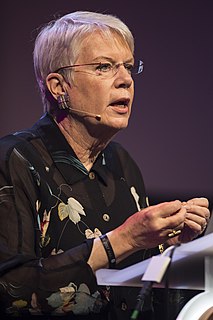A Quote by Seth Shostak
Thanks to the fact that the Earth isn't a perfect sphere, and invoking a bunch of Newtonian physics, you can deduce that our planet wobbles, too, taking roughly 26,000 years to trace out a small circle on the sky, a phenomenon known as precession.
Related Quotes
As the planet wobbles, once every 26,000 years we visually align with the center of the galaxy. But it's such a slow movement that as we enter the galactic equator (The band of stars in the sky - The Milky Way), it takes 18 years to get to the middle of it, and another 18 to exit it. So astronomically, "The 2012 experience" is a 36 year alignment process, not something that happens on Dec 21, 2012.
17,000 children starve on this planet every single day. That fact alone should blow any conscious person out of their chair. You know, my mother used to say that a woman’s most important job is taking care of her children and her home. I laughed at that when I was younger, but I don’t laugh at it anymore. I just realize now that every child on the planet is one of our children, and the earth itself is our home.
The Earth is cylindrical, three times as wide as it is deep, and only the upper part is inhabited. But this Earth is isolated in space, and the sky is a complete sphere in the center of which is located, unsupported, our cylinder, the Earth, situated at an equal distance from all the points of the sky.
Suddenly, from behind the rim of the moon, in long, slow-motion moments of immense majesty, there emerges a sparkling blue and white jewel, a light, delicate, sky-blue sphere laced with slowly swirling veils of white, rising gradually like a small pearl in a thick sea of black mystery. It takes more than a moment to fully realize this is Earth ... home. My view of our planet was a glimpse of divinity.
There is nothing wrong with the planet. The planet is fine ... been here 4 1/2 billion years. We've been here, what, a 100,000 years, maybe 200,000. And we've only been engaged in heavy industry a little over 200 years. 200 years versus 4 1/2 billion. And we have the conceit to think that somehow we're a threat? The planet isn't going away. We are.
Although humans have existed on this planet for perhaps 2 million years, the rapid climb to modern civilization within the last 200 years was possible due to the fact that the growth of scientific knowledge is exponential; that is, its rate of expansion is proportional to how much is already known. The more we know, the faster we can know more. For example, we have amassed more knowledge since World War II than all the knowledge amassed in our 2-million-year evolution on this planet. In fact, the amount of knowledge that our scientists gain doubles approximately every 10 to 20 years.
Our planet has been around only for four and a half billion years. Let's imagine a planet that has life on it such as life is on Earth and it's seven billion years old. Let's say that planet evolved intelligence. Well, that intelligence would be way more advanced than what we call intelligence here on Earth. How long has intelligence been around on Earth as we've come to define it?
Centuries hence, when current social and political problems may seem as remote as the problems of the Thirty Years' War are to us, our age may be remembered chiefly for one fact: It was the time when the inhabitants of the earth first made contact with the vast cosmos in which their small planet is embedded.


































